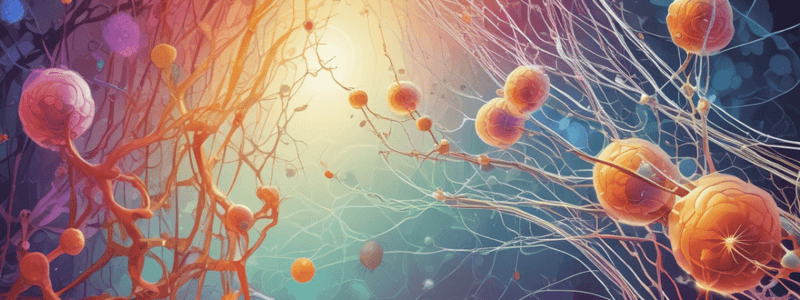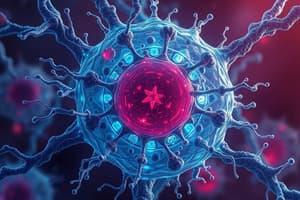Podcast
Questions and Answers
What are the three main ways cells signal to each other in large organisms?
What are the three main ways cells signal to each other in large organisms?
- Gap junctions, exocytosis, and hormone release
- Direct toxicity, hormone receptors, and gap junctions
- Exocytosis, gap junctions, and local signaling (correct)
- Exocytosis, osmosis, and direct stimulus
Which of the following is not a function of cellular signals in multicellular organisms?
Which of the following is not a function of cellular signals in multicellular organisms?
- Causing the cell to change its activities
- Speeding up cell production
- Fusing cells together (correct)
- Slowing down cell production
What is one key function of hormones in cellular communication?
What is one key function of hormones in cellular communication?
- Carrying signals from one part of the body to another (correct)
- Transporting visual information between cells
- Supplying energy directly to cells
- Providing rapid information transfer
What is the consequence of the body not having enough energy produced by mitochondria?
What is the consequence of the body not having enough energy produced by mitochondria?
How do gap junctions contribute to cellular communication?
How do gap junctions contribute to cellular communication?
What role do exocytosis processes play in cellular communication?
What role do exocytosis processes play in cellular communication?
What is a major symptom caused by LCHRs (Leigh-like congenital lactic acidosis hereditary recessive disorders)?
What is a major symptom caused by LCHRs (Leigh-like congenital lactic acidosis hereditary recessive disorders)?
How do hormones differ from other signal molecules in terms of cellular communication?
How do hormones differ from other signal molecules in terms of cellular communication?
What is a key characteristic of cells in multicellular organisms?
What is a key characteristic of cells in multicellular organisms?
How do cells specialize within a multicellular organism?
How do cells specialize within a multicellular organism?
What role do red blood cells play in the body?
What role do red blood cells play in the body?
Where are chloroplasts typically found in a plant?
Where are chloroplasts typically found in a plant?
What is the function of white blood cells?
What is the function of white blood cells?
What unique feature do cells in the upper epidermis of some plants have?
What unique feature do cells in the upper epidermis of some plants have?
What is NOT a function of specialized cells in plants?
What is NOT a function of specialized cells in plants?
What determines the unique function of a specialized cell?
What determines the unique function of a specialized cell?
Which organ has the highest percentage of cell volume attributed to mitochondria?
Which organ has the highest percentage of cell volume attributed to mitochondria?
How does the organization of cells into tissues, organs, and organ systems benefit a multicellular organism?
How does the organization of cells into tissues, organs, and organ systems benefit a multicellular organism?
Why are tissues reliant on ATP production adversely affected by defective mitochondria?
Why are tissues reliant on ATP production adversely affected by defective mitochondria?
Which level of organization is directly responsible for performing a specific function within multicellular organisms?
Which level of organization is directly responsible for performing a specific function within multicellular organisms?
How would you graph the distribution of mitochondria in various organs?
How would you graph the distribution of mitochondria in various organs?
Which statement best describes the role of tissues in multicellular organisms?
Which statement best describes the role of tissues in multicellular organisms?
What is a potential consequence of having defective mitochondria in heart tissue?
What is a potential consequence of having defective mitochondria in heart tissue?
What constitutes an organ system in the provided example?
What constitutes an organ system in the provided example?
How do single-celled organisms maintain homeostasis?
How do single-celled organisms maintain homeostasis?
Which of the following is not a way multicellular cells work together to maintain homeostasis?
Which of the following is not a way multicellular cells work together to maintain homeostasis?
What is essential for unicellular organisms to successfully maintain homeostasis?
What is essential for unicellular organisms to successfully maintain homeostasis?
What role do stem cells play in multicellular organisms?
What role do stem cells play in multicellular organisms?
Why are cells considered the most numerous type of life on Earth?
Why are cells considered the most numerous type of life on Earth?
Which statement accurately describes autotrophic unicellular organisms?
Which statement accurately describes autotrophic unicellular organisms?
What describes the primary difference between unicellular and multicellular organisms in the context of homeostasis?
What describes the primary difference between unicellular and multicellular organisms in the context of homeostasis?
Which process among the following is not directly involved in unicellular homeostasis?
Which process among the following is not directly involved in unicellular homeostasis?
Flashcards
Cell signaling methods
Cell signaling methods
Three primary ways cells communicate: exocytosis, gap junctions, local signaling.
Non-function of signals
Non-function of signals
Fusing cells together is not a cellular signaling function in multicellular organisms.
Hormone function
Hormone function
Hormones carry signals across distances within the body.
Mitochondria energy
Mitochondria energy
Signup and view all the flashcards
Gap junctions role
Gap junctions role
Signup and view all the flashcards
Exocytosis process
Exocytosis process
Signup and view all the flashcards
LCHRs symptoms
LCHRs symptoms
Signup and view all the flashcards
Hormones vs. other signals
Hormones vs. other signals
Signup and view all the flashcards
Characteristics of multicellular cells
Characteristics of multicellular cells
Signup and view all the flashcards
Cell specialization
Cell specialization
Signup and view all the flashcards
Red blood cells function
Red blood cells function
Signup and view all the flashcards
Chloroplast location
Chloroplast location
Signup and view all the flashcards
White blood cells function
White blood cells function
Signup and view all the flashcards
Upper epidermis feature
Upper epidermis feature
Signup and view all the flashcards
Plant cell function
Plant cell function
Signup and view all the flashcards
Cell arrangement role
Cell arrangement role
Signup and view all the flashcards
Heart mitochondria
Heart mitochondria
Signup and view all the flashcards
Cell organization benefits
Cell organization benefits
Signup and view all the flashcards
Defective mitochondria impact
Defective mitochondria impact
Signup and view all the flashcards
Tissue function
Tissue function
Signup and view all the flashcards
Consequences of defective mitochondria
Consequences of defective mitochondria
Signup and view all the flashcards
Organ system example
Organ system example
Signup and view all the flashcards
Unicellular homeostasis methods
Unicellular homeostasis methods
Signup and view all the flashcards
Non-collaborative homeostasis
Non-collaborative homeostasis
Signup and view all the flashcards
Unicellular reproduction
Unicellular reproduction
Signup and view all the flashcards
Stem cells role
Stem cells role
Signup and view all the flashcards
Numerous cells on Earth
Numerous cells on Earth
Signup and view all the flashcards
Autotrophic unicellular organisms
Autotrophic unicellular organisms
Signup and view all the flashcards
Unicellular vs. multicellular homeostasis
Unicellular vs. multicellular homeostasis
Signup and view all the flashcards
Uninvolved process in unicellular homeostasis
Uninvolved process in unicellular homeostasis
Signup and view all the flashcards
Study Notes
Homeostasis and Cells
The Cell as an Organism
- Cells are the basic living unit of all organisms, and sometimes a single cell is the organism.
- Single-celled organisms grow, metabolize, respond to environmental changes, and reproduce to maintain homeostasis.
Autotrophic Organisms
- A unicellular cell needs to find a source of energy to maintain its cell membrane and form.
- Cell division is essential to maintain homeostasis.
Multicellular Life
- In multicellular organisms, cells work together to achieve a common goal, like members of a football team.
- Cells in multicellular organisms are specialized, each with a particular function such as muscle, nerve, or skin cells.
Cell Specialization
- Specialized cells have different roles due to the arrangement of genes within them.
- Red blood cells carry oxygen and have enough iron to do so.
- White blood cells help heal tissue damage.
Specialized Plant Cells
- Plant cells contain chloroplasts, the organelles where photosynthesis occurs.
- Cells in leaves have numerous chloroplasts, while cells in roots have few or none.
Mitochondria in a Mouse
- The percentage of cell volume contributed by mitochondria varies in different organs, such as the heart, brain, and pancreas.
Levels of Organization
- A tissue is a group of similar cells that perform a particular function.
- Tissues form organs, which form organ systems.
- Organ systems work together to maintain homeostasis.
Cellular Communication
- Cells in large organisms communicate through chemical signals passed from cell to cell.
- There are three main ways cells signal: directly through gap junctions, exocytosis of signal molecules, and by a combination of gap junctions.
Studying That Suits You
Use AI to generate personalized quizzes and flashcards to suit your learning preferences.
Description
Explore how single-celled organisms and multicellular organisms maintain homeostasis. Learn about the importance of cells, tissues, organs, and organ systems.




